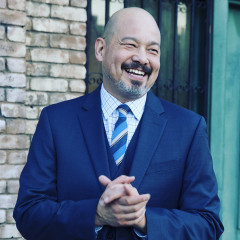Entertainment Spotlight
Actor Tim Lounibos - Hopeful Opportunities Ahead for APA's in Hollywood Movies and Television
The Recording Industry's Push to Stop Illegal File Sharing
Ever since the original Napster.com galvanized people on the issues of illegally sharing copyrighted music over the internet, new companies have sprouted up to solve this problem.
Digital Rights Management
Since 1999, millions of copyrighted songs have been shared illegally on peer-to-peer (P2P) networks. In response, the Recording Industry Association of America (RIAA) has tried suing the networks out of existence.
Today, the RIAA filed copyright infringement lawsuits against more than 700 illegal file sharers, including individuals at 26 universities. The legal action by the major record companies also named 32 individuals at the schools for using their college networks to distribute illegally copyrighted recordings on unauthorized peer-to-peer services.
The RIAA was successful against Napster, the mother of all P2P networks, which was shut down in 2001. However, the industry has not been successful against the likes of KaZaA and Morpheus, because unlike Napster these networks have no central server, and as a result, these companies have no control over the actions of their users.
Unable to remove these networks through direct litigation, the entertainment industry has taken the controversial tactic of suing the users of the network.
Many of the users of these P2P networks are college students, and for good reason. College students have a ravenous taste for music, new and old, and only a small proportion of students actually have the funds to pay for the music that interests them. College students also often have access to fast online networks for downloads. One P2P service, the i2hub network, founded by a college student, is now one of the largest sources for illegally downloaded movies on campuses. It takes advantage of internet 2, a faster version of the internet designed for universities to share data among researchers.
As the RIAA has stepped up its targeting of college students and the colleges which are proving the high speed internet access that these students are using, some institutions are beginning to monitor their student's internet access, and penalize them if they download copyrighted works.
Several options being pursued by universities are to provide students with open access to digital archives of music and films, much as they provide free access to books in the library. Penn State University has provided its students with unlimited access to the now-legal version of Napster which is licensing music content to universities.
Napster's approach has been met with mixed reviews, especially for users of Apple computers which are incompatable to Napster's downloads. Two start-ups, Cflix and Ruckus, have the same goal of licensing collegs with digital media.
Another viable option of delivering legal downloads would be to have music companies and music libraries to partner directly with major online communities, particularly the online social networks where students and other music lovers congregate.
With the continued decline in overall music sales in the U.S., the traditional distribution system is changing rapidly. With the use of discounted music as loss-leaders at retailers such as Walmart, which sells 20% of all CD's in the US, the small town music store is all but doomed.
Although no user wants to have their rights limited, representatives from the entertainment industry argue that digital protections enable markets to flourish where they could not otherwise exist. Universal Music's David Benjamin says,"How would theaters exist if they could not charge for tickets at the door?"
Likewise, if HBO were unable to prevent non-subscribers from accessing its content, then it would not be able to fund its award-winning shows, such as 'Sex and the City' or 'The Sopranos'. Similarly, the Apple Online Music Store, the most successful example of commercial music download distribution, was only made possible because Apple was able to distribute music in a way that prevented mass copying, and at an affordable price at 99 cents a song.
The options above are just a few ways the recording industry is scrambling to find new channels to distribute its music, while playing Keystone cops to all the illegal file-sharers. One thing is sure, with the recording industry in its current state, more and more legal and affordable music download options will be made available for consumers in the future.


